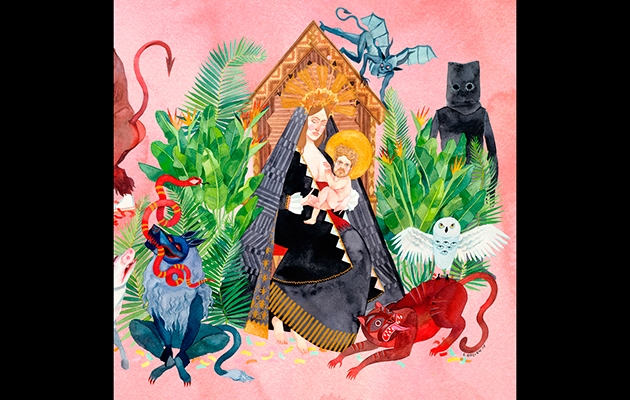Until recently, Josh Tillman was best known for drumming in Fleet Foxes between 2008 and 2012. Before and during that time Tillman made several slow, sad solo albums which seemed specifically designed to make tiny ripples rather than big waves, but his departure from the band after Helplessness Blues, seemed to trigger a creative rebirth.
Rechristening himself Father John Misty, in 2012 Tillman released Fear Fun. Escaping the shadow of Fleet Foxes and the weight of his own moroseness, here was a funnier, truer writer exploring a more adventurous palette of sounds. If that record marked a significant step forward, the follow-up is even more impressive. An epic creation which takes its cues from the likes of Harry Nilsson, Randy Newman, Dory Previn and John Grant, it belongs to that honourable tradition of American songwriting which sets beautifully orchestrated pop and AOR against brutally honest and sometimes comically profane sentiments, sung with dramatic, edge-of-the-cliff conviction.
As Tillman explained in last month’s Uncut feature, it’s searingly personal stuff. Ostensibly, the album follows what Paul Simon called the arc of a love affair, covering the period when he met, romanced and committed to his wife Emma, but it’s really about one man’s struggle to accept love and hope into his life. In a record peppered with colourful lines, the key lyric is a matter-of-fact one, buried amid the thick, soulful stomp of “When You’re Smiling And Astride Me”: “I can hardly believe I found you / And I’m terrified by that.”
This is love red in tooth and claw. There is romance here, but there’s also raw sexual need, jealousy, druggy paranoia, hissy fits, over-sharing and megalomania. “Chateau Lobby #4 (In C For Two Virgins)” manages to be both bawdy – “I want to take you in the kitchen / Lift up your wedding dress…” – and touchingly innocent, depicting the couple’s first sexual tryst as though it was the very first time for them both. An instantly memorable SoCal pop confection, with its mariachi flourishes and wonderful swelling bridge it’s like Love in love. That first euphoric flush gives way to the jealously of the long distance lover on the plush, artfully conceived country-soul of “Nothing Good Ever Happens At The Goddamn Thirsty Crow”, where Tillman stares into the abyss from an Ibis hotel in Germany. “Holy Shit”, written the day before his wedding, compiles all the reasons stacked up against taking the plunge. The very act of falling in love clearly defies all logic, and yet Tillman is defiant: “I fail to see what all of that has to do with you and me.”
Co-produced again with Jonathan Wilson, the album bristles with richness and bespoke detail. “Bored In The USA” is a spare piano ballad lifted to sublime heights by restrained strings, disquieting sampled laughter and one of several stunning vocal performances. The sparkling “Strange Encounter” has Spectoresque drums and a buzzing guitar solo, while the Byrdsy “The Night Josh Tillman Came To Our Apt.” (I Love You, Honeybear is the kind of self-portrait in which autobiography frequently elides into self-mythology) is another sweet and sour pick-and-mix of unspeakably tender music and hilariously caustic lyrics. Only “True Affection” seems misjudged, a synthetic pop song which fits the narrative but which roams too far from the defining mood of the album.
Otherwise, there is a neatly circularity to it all. On the opening title track Tillman is content to settle for solidarity in mutual distress, as though finding another damaged person with whom to share his sadness is about the best he can hope for. The prize that emerges as the record unfolds, however, is not merely solace but transformation. By the closing track, the bewitching “I Went To The Store One Day”, Tillman seems dazed to discover that his world could be so completely turned upside down. “Seen you around, what’s your name?” he sings, remembering the very first encounter with Emma outside the local store. From such banal beginnings a new life – and a truly compelling new album – have bloomed.

Q&A
Josh Tillman
You’ve talked about “chasing the sound” for this record. Can you elucidate?
This album is a monument to second guessing. I was afraid that it was going to be sentimental, because of the subject matter, and I was terrified of trivialising the experiences that inform the album. I couldn’t get the soufflé to rise, and I couldn’t until Emma said to me, “You just can’t be afraid to let these songs be beautiful.” Once I got that I wasn’t making the album I made last time, and that I didn’t know myself artistically as well as I thought I did, things really started to come together.
Was it a struggle to allow yourself to reveal so much?
If you’re going to write songs about this topic, they really have to be written in the moment. There are a lot of ugly sentiments on the album – there are some emotions that I’m not particularly proud of, or are not a good prescription for human living, but everything had to stay in there or else it was going to be garbage. From a distance it’s a love album, but the closer you get it’s really about me and my problems with intimacy.
Is it a concept album?
I think to all intents and purposes it’s a conceptual album. Every time you insert yourself into your art, you become a character.
INTERVIEW: GRAEME THOMSON



